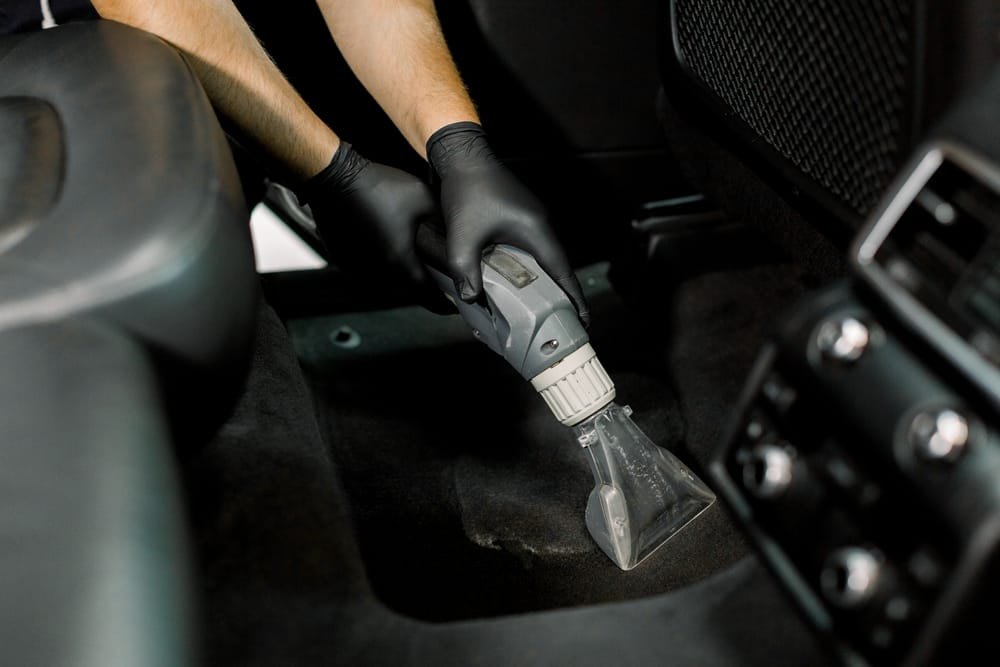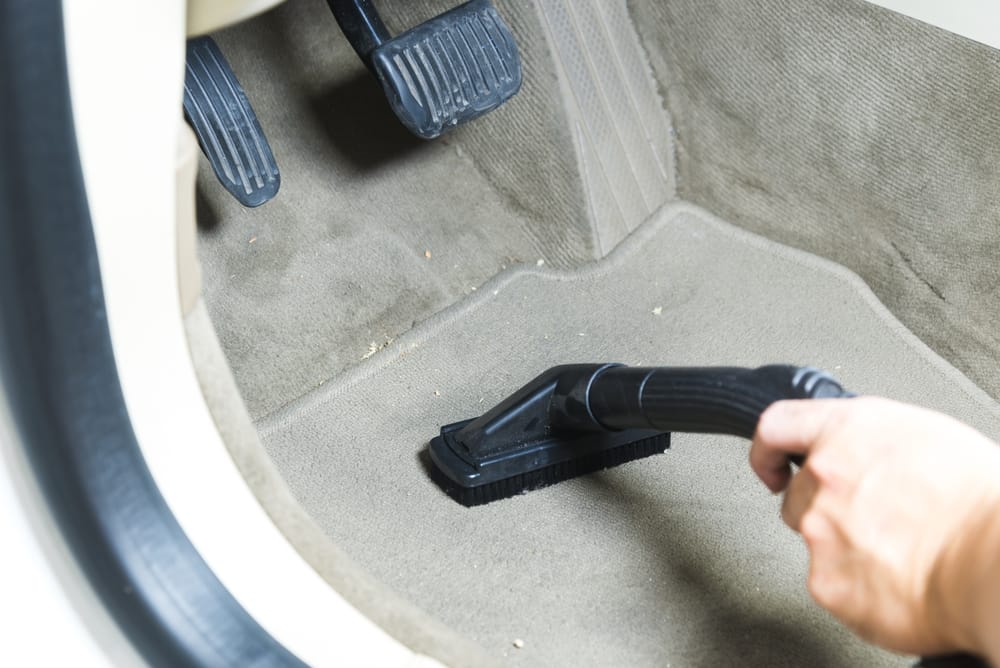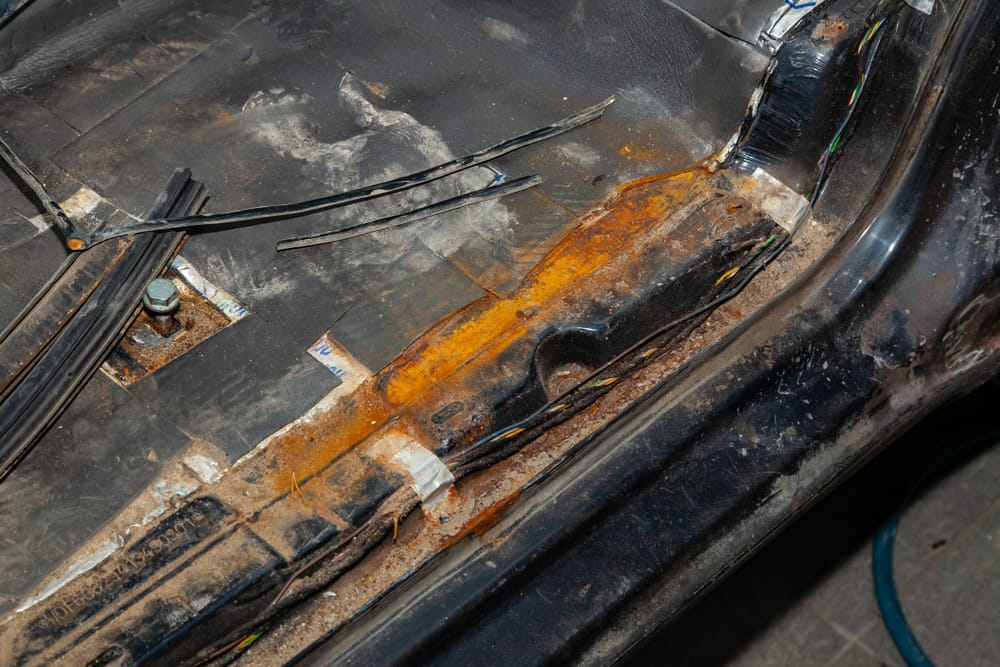Water has no business wetting the floor of your car.
The floor of your car could be wet for several reasons, including a
leaking air conditioning system, clogged drains, damaged window
weatherstripping, failing door seals, or a bad heater core.
Let's explore these probable causes and effects of a wet car floor in more
detail.
 Vacuuming water off a car floor.
Vacuuming water off a car floor.
How Is Water Getting Inside My Car?
The water inside your car could get in through your car's doors,
windows, windshield, or sunroof. It can also seep into the vehicle if
the air conditioning system drain becomes clogged or the heater core of
the heating system leaks.
Here is how the water may be seeping inside your car:
Through The Doors, Windows, Windshield, Or Sunroof
There are various reasons why the doors, windows, sunroof, or windshield of
your car may suddenly start leaking.
-
Faulty Sealing
: The doors, windows, windshield, and sunroof are tightly sealed to
keep the rainwater out of your passenger cabin. Their sealing gasket
and rubber can deteriorate as time passes, creating small gaps that let
the water in.
-
Damaged Weatherstripping
: The windows of your car have black weatherstripping around the glass
surface for sealing. This rubber strip can dry up, become brittle, and
disintegrate. When this happens, your vehicle's windows can leak,
making your car's floor wet.
-
Leaking Sunroof
: The sunroof of a vehicle is fitted inside a sunroof tray with drain
holes in all corners. If any of these holes or their connected drain
hoses become clogged, it can make water leak into the passenger cabin.
-
Clogged Drains
: The doors and your car's windshield have dedicated drain hoses that
harmlessly expel moisture and water onto the ground. If these drains
become blocked, it can force the water inside your car.
Clogged Car AC Drain
The evaporator of your car's air conditioning system is ice cold, which
causes moisture to form on its surface.
This moisture is usually expelled from the car via the AC drain hose behind
the dashboard.
The condensation will make the passenger side floor mat wet if this drain
hose becomes blocked due to leaves, litter, or other road debris.
Leaking Heater Core
Hot coolant circulates through the heater core, which converts some of the
coolant's heat into warm air to heat the vehicle's cabin.
If the heater core springs a leak, the coolant mixture may spill on your
car floor.
Body Seam Leak
A car's body is created by welding various panels together. Their joining
points are then made waterproof by running a sealer across the seams.
If this sealer is missing or breaks because of an impact, the seam might
open and let water enter your car.
 Vacuuming a wet car floor.
Vacuuming a wet car floor.
Is It OK For The Car Floor To Be Wet?
No, it is not OK for the car floor to be wet. A wet car floor can cause
carpet rot, wiring faults, and floor pan corrosion. It also poses a
health hazard by promoting mold and harmful bacterial growth.
Some ways a wet floor can be harmful to you and your car are:
Mold Growth
A wet car floor serves as an excellent breeding ground for mold.
Mold can develop within 24 to 48 hours of water exposure and cannot be
eliminated until the source of moisture is fixed.
Once the mold starts thriving, it can quickly affect your health. For
example, you may experience eye and throat irritation, skin irritation,
wheezing, and nasal stuffiness.
Buildup of Harmful Bacteria
A wet car floor also promotes bacterial growth. Any microbes that have
settled into the car carpets from the air or brought in by your shoes will
start thriving in a wet environment.
Some of these are responsible for serious illnesses such as fever,
diarrhea, and stomach cramping.
Accelerated Carpet Wear
Water exposure can also accelerate carpet wear.
Car carpets lose fibers with use and age. But if they remain wet for a few
days, it can cause the mildew to settle in. And once that happens, it is
very difficult to get the smell out.
 Rusty car floor caused by moisture.
Rusty car floor caused by moisture.
Corrosion
Your car floor is made of metal; if you let it stay wet, the water will
start corroding it.
If the water leaks from the windows, it may get into the power window
assembly, rusting the track or shorting the internal wiring system.
What To Do When My Car Floor Is Wet?
Your car floor can become wet for various reasons. But first, you must
find the exact cause and fix the issue.
Water can enter your car's cabin due to a leak or
blockage. Here are some ways to fix the problem:
Unclog Blocked Drains
The body panels throughout the car, such as the doors, have drain holes
that allow rainwater to escape if it leaks in.
Blocked drain hoses are the most common cause of a wet car floor.
You can fix this problem with a simple coat hanger. Use it to remove the
dirt and buildup blocking the drain hose in the windshield, sunroof, air
conditioner, and doors.
You can use an air compressor or pour water down the drain hose to check
whether it is working again or not.
Reseal The Windshield
Factory-fitted windshields are less susceptible to leaking. But if you have
installed an aftermarket model, its improper sealing may be why water is
seeping into your car floor.
Resealing the windshield may resolve the problem.
Replace The Weatherstripping
Worn weatherstripping and door seals can also lead to wet car floors.
Removing the old rubber seals and replacing them with new ones can help
solve the issue.
Replace Faulty Components
If your car floor is wet because of a leaky evaporator drain or heater
core, replacing the faulty part can stop the water from seeping into your
passenger-side floor mat.
However, this is a job best left to professionals.
How Can I Fix A Wet Car Floor?
When your car floor is wet, you must remove all the liquid to prevent
damage.
You can try wet vacuuming, air drying, dehumidifying, or sprinkling
moisture-absorbing products to remove the water.
Here is what you should do:
-
If your carpet is soaked in water, use a dry/wet vacuum to collect the
moisture.
-
If it is damp, not soaking wet, you can lift the water with a cloth or
paper towel.
-
Remove the floor mats and leave them outside to dry.
-
Lift the carpet and prop it up to create an air pocket underneath. Use
paper towels to absorb the water below.
-
You can also place a dehumidifier inside the vehicle to remove the
excess moisture.
-
Park in a safe place and keep the doors open to air out the car.
-
You can also place a stand-up fan or window unit fan model beside the
vehicle to increase airflow and evaporate water.
-
Putting the heater on full blast also helps accelerate the evaporation
process.
-
You can use a hairdryer for trouble areas, like under the seat.
-
Placing moisture-absorbing products like baking soda or damp-rid bags
will also help dry your car floor faster.
-
Kitty litter also works well in pulling moisture from the car floor.
Conclusion
There are several reasons why your car floor could be wet.
It can be as simple as a blocked drain or as complex as a leaking heater
core.
Water on the car floor can harm your car and your health. It can corrode
car components and pose a health risk by promoting mold and bacterial
growth.
Once you know that your car floor is wet, you should immediately address
the cause and dry your car out.